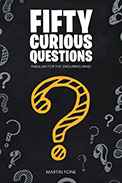
 |
Nothing grabs a reader’s attention quite like starting a book off with some mild bathroom humor. If you’ve ever wondered whether releasing flatulence encourages weight loss, why Greek statues are not well-endowed, or whether an empty beer bottle smashed on your head might be more lethal than a full bottle of beer, then this is the right book for you.
Fone has a uniquely charming way of introducing puzzling topics, including whether apples and oranges are really incomparable (They aren’t), and whether humankind has already reached the evolutionary pinnacle (No, as being lactose tolerant and having blue eyes are both genetic mutations). Readers who are scientifically inclined will enjoy Fone’s simple yet comprehensive explanations of the research behind the answers to some of life’s most puzzling conundrums (e.g. Do dog fleas or cat fleas jump farther?). Even readers who generally prefer the fantasy worlds of science fiction will appreciate Fone’s style—humorously self-deprecating at times, and firmly tongue-in-cheek. Another pleasing aspect of this short book is the tendency of the author to draw together vignettes from all different disciplines. The fiftieth curious question in this collection—“Does the humble carrot make you see better in the dark?”—is a perfect example.
Readers will venture from military history to the science of radar to benevolent propaganda to pop culture to vitamin science to patriotic Dutch horticulturalists—all in fewer than two concise pages. So if you’re looking for some surprising factoids to amaze and astound your friends, you’ve picked up the right book. After all, where else could you read about putting someone’s hands in a bucket of slimy frogs for the sake of scientific advancement?
RECOMMENDED by the US Review